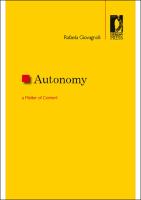Autonomy: a Matter of Content
Abstract
Autonomy is the core of a lively debate on moral and political philosophy, where many competing perspectives and conceptual distinctions are presented. Several authors tend to override the metaphysical questions of determinism and free will: this is the right step for emphasizing the dimensions of individual choice as well as the role of socialization in developing capacities for critical reflection. In this context, the most important distinction is between "moral" autonomy and "personal" autonomy. Generally speaking, the theorists of personal autonomy try to give an account of autonomy that is conceived not only as moral agency. This move allows the consideration of several patterns of practical reasoning that imply several kinds of reasons for acting. The argumentation considers the discussion between "procedural" and "substantive" theories. Procedural theories emphasize the structural conditions of the process of "identification" with one's own motives. Even if these conditions are relevant, substantive theories rightly point to the role of the content of our reasons for autonomous agency. This perspective requires substantive standards according to which we can recognize and criticize oppressive norms. The main theoretical proposal of this work is to show the normative requirements for autonomy. An intersubjective model is promising if we consider socialization from the point of view of the process through which we develop the cognitive and moral capacities necessary for autonomy. The "scorekeeping" model, (an original variant of Wittgenstein's linguistic game as proposed by Robert Brandom) seems to offer the deontic structure of discursive practices in which the agents have the possibility of discussing and criticizing their own and others' reasons.


 Download
Download Web Shop
Web Shop